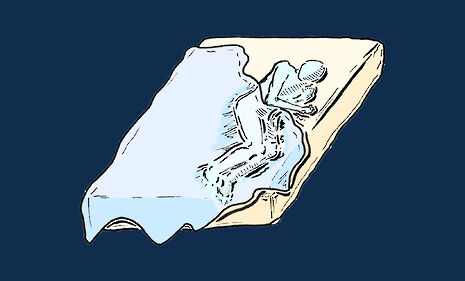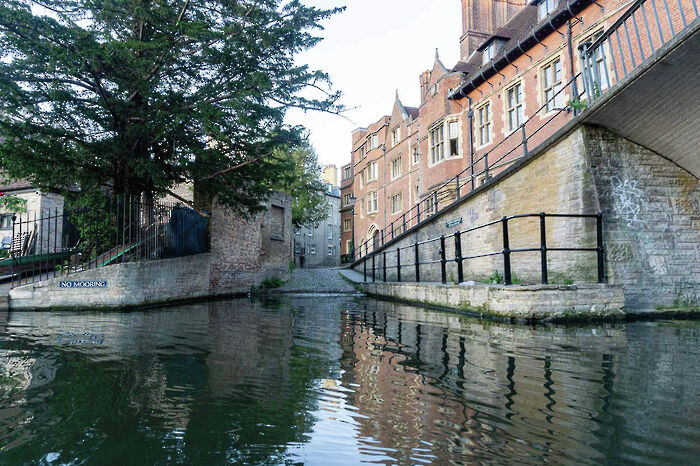It’s week 3 of term, and you can’t get out of bed
For most students, just like for me, Cambridge won’t instantly become the best place in the world, contrary to the glossy version of university life you hear

Content note: This article contains detailed discussion of mental illness, including depression, substance abuse, and hysteria
I first arrived at Cambridge on a sunny day in September, just as summer was slowly turning into autumn. The River Cam was glistening, and the narrow streets of the city centre seemed quaint, and charming. Later in my first term I would be lying down under the trees with my headphones in my ears, desperately trying to silence the throbbing pain in my head and escape the suffocation of the city centre.
My mother said that Clare looked like a palace, and my dad took a photo of my name painted on the board in front of Staircase X. They were so proud of me, and in that moment, for the first time in my life, I was proud of myself. I also felt emotionally stable for the first time in a while: I had a support network of friends scattered all over Poland; a boyfriend with whom I was trying out a long-distance relationship; and family who were always eager to chat on the phone or visit me if I needed them to.
But Poland was still almost 1,000 miles away from England. Instead of helping me feel closer to them, frequent video calls with my family and friends made me feel even more isolated. I felt that my friends and family were having the times of their lives back in Poland and I was stuck in England. I was torn apart between the two countries and I was enjoying myself in neither of them.
And then came my third evening at Cam, my first hysteria in my tiny, bleak room. I would later get used to these attacks. My neighbours probably would too.
During my first weekend at Cambridge I came to the conclusion that I would stay in my room and study because I didn’t have any friends (though of course, looking back, no one did at that point). During my first year I would spend as many as four consecutive days without talking to anyone.
In the third week of Michaelmas, I woke up but, still tired, I went back to sleep and I skipped my classes for the first time. I spent my first day in bed reading about five pages of a book I can’t remember, and wasted the rest of the day watching videos on YouTube.
The rest of Michaelmas passed by in a blur of cheap wine and cigarette smoke. I don’t remember how many weekend nights I spent on my bathroom floor, my cheek glued to the toilet seat. In fact, I don’t remember much from those nights at all, except maybe for the odour of wine, which makes me sick even now.
Over the Christmas break, I promised myself that I would go to the university counselling service the moment I arrived back in Cambridge. I promised myself that I would be the best and the strongest version of myself because I believed that was what I should be aiming for. I wanted to be myself again, to stop feeling so disconnected from everything that was happening around me, to be able to go out with friends and not have to leave early because of my anxiety creeping into every moment of the evening.
“My mind fell into an irrational trap of thinking that everybody around me was having the time of their lives”
But I didn’t go to the counselling service in Lent term. I only went there in the second week of Easter term when I was so numbed by my repetitive spells of hysteria and despair that even the embarrassment I felt when admitting that I wasn’t doing fine didn’t seem to matter anymore.
I don’t have any sympathy for myself anymore, nor do I blame others for not answering the phone when I needed them, for being too busy with their own problems, or for using my vulnerability at the time to fill the void they felt. But I do blame myself for not deciding to talk to a lovely girl who knocked at my door when she heard me cry, or for staying in my room whenever a bigger group from my floor was going out.
I blame myself for postponing my visit to the counselling service until the moment I felt that nothing exciting would ever happen in my life and nothing would ever interest me. Contrary to how it might seem when you arrive at Cambridge, very few people know what they are doing. The vast majority feel lost and need others as much as you do, and are as stressed and anxious about finding new friends as you. I didn’t realise that at the time, my mind fell into an irrational trap of thinking that everybody around me was having the time of their lives and I was the only one imprisoned in the four walls of my room, unable to take my life into my own hands.
I spent my first year mostly pretending before myself that I was doing great, which made me feel even more frustrated because I was doing miserably for most of this time. I thought that I didn’t have the right to feel disappointed and unhappy just because I was in Cambridge and Cambridge was supposed to be the place from my dreams, wasn’t it? The moment I realised that this place – filled with such unique and remarkable individuals – isn’t somewhere from a fairytale, and people there are allowed to have (and actually do have) the same problems as everybody else, I started to feel better.
Cambridge hasn’t met any of my expectations but as soon as I stopped expecting anything from it and stopped pressuring myself to feel constantly happy and fulfilled, I started enjoying my time here.
For most students, just like for me, Cambridge won’t instantly become the best place in the world, contrary to the glossy version of university life you hear during freshers’ week and in university prospectuses. But the time you spend here has the potential to be one of the most valuable and remarkable times of your life. Don’t let your perfectionism ruin this unique time. Don’t let your stubbornness in pretending that you are someone you’re not make you isolated and unhappy. You haven’t come to Cambridge to just get through your degree, you’ve come here to get out of your room, to embrace the weirdness of this place and all of its people, no matter how unprepared you feel.
 News / Judge Business School advisor resigns over Epstein and Andrew links18 February 2026
News / Judge Business School advisor resigns over Epstein and Andrew links18 February 2026 News / Gov grants £36m to Cambridge supercomputer17 February 2026
News / Gov grants £36m to Cambridge supercomputer17 February 2026 News / CUCA members attend Reform rally in London20 February 2026
News / CUCA members attend Reform rally in London20 February 2026 News / Union speakers condemn ‘hateful’ Katie Hopkins speech14 February 2026
News / Union speakers condemn ‘hateful’ Katie Hopkins speech14 February 2026 News / Hundreds of Cambridge academics demand vote on fate of vet course20 February 2026
News / Hundreds of Cambridge academics demand vote on fate of vet course20 February 2026










